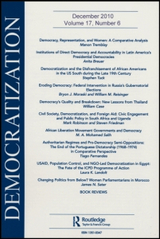
Social media and protest mobilization: evidence from the Tunisian revolution
Breuer, Anita / Todd Landman / Dorothea FarquharExternal Publications (2014)
published on Democratization
This article explores how social media acted as a catalyst for protest mobilization during the Tunisian revolution in late 2010 and early 2011. Using evidence from protests we argue that social media acted as an important resource for popular mobilization against the Ben Ali regime. Drawing on insights from “resource mobilization theory”, we show that social media (1) allowed a “digital elite” to break the national media blackout through brokering information for mainstream media; (2) provided a basis for intergroup collaboration for a large “cycle of protest”; (3) reported event magnitudes that raised the perception of success for potential free riders, and (4) provided additional “emotional mobilization” through depicting the worst atrocities associated with the regime's response to the protests. These findings are based on background talks with Tunisian bloggers and digital activists and a revealed preference survey conducted among a sample of Tunisian internet users (February–May 2012).
